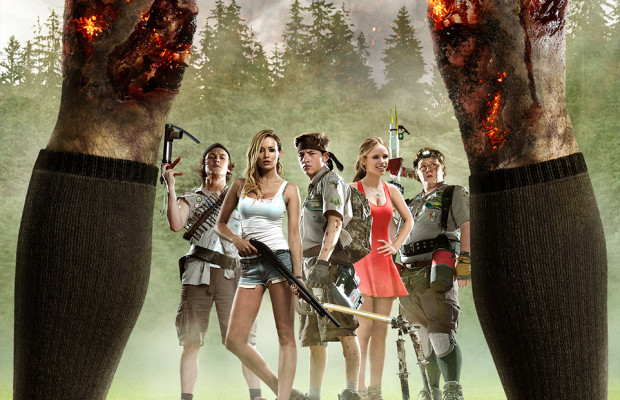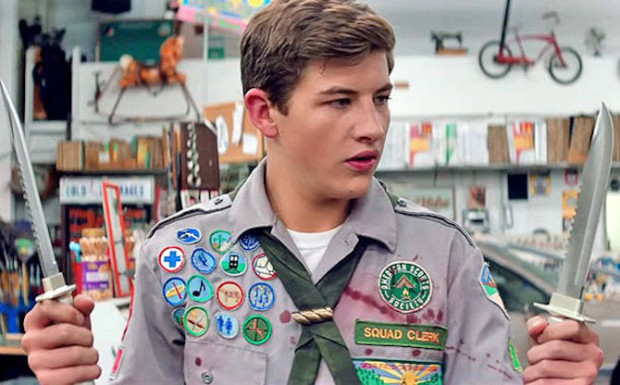Genre: Horror-Comedy
Premise: (from IMDB) Three scouts, on the eve of their last camp-out, discover the true meaning of friendship when they attempt to save their town from a zombie outbreak.
About: This script somehow made the 2010 Black List. It has steadily moved through the system, securing actor Tye Sheridan (Mud) and director Christopher Landon (Paranormal Activity: Marked Ones). It was written by comedy team Emi Mochizuki and Carrie Lee Wilson, whose only previous credit was the 2008 Martin Lawrence film, College Road Trip. The movie hits theaters later this fall.
Writers: Emi Mochizuki and Carrie Lee Wilson (the production draft you see in theaters was rewritten by Christopher Landon and Lona Williams).
Details: 114 pages (2010 draft that made the Black List)
Boy Scouts Vs. Zombies was one of the last of the zombie wave of scripts to sell back in 2010. You have to remember that this was during a time where a script titled “Zombie Baby” sold. A 2010 zombie spec was the equivalent of a lottery ticket. It was the trend that wouldn’t stop trending, kind of like biopics today.
Still, this specific sale has always baffled me. There’s nothing inherently clever or ironic about the premise. It’s so arbitrary, it’s as if they picked a random group of people, said, “Let’s pit them against zombies,” and that was it.
It’s no different from “Clowns vs. Zombies,” or “Politicians vs. Zombies,” or “Skaters vs. Zombies.” There’s no clear connective tissue between this group and the undead.
“Grocery Store Employees vs. Zombies!”
Yet still they managed to get one of the hottest young actors in Hollywood to join the film. What’s up with that?? I mean this guy was in Mud and Tree of Life. Was his agent high when he read this? “Okay Tye, you’ve worked on some pretty impressive stuff so far. But I found something can’t-miss. Are you ready for this? Boy Scouts. Vs. Zombies. Waddaya say?”
All of this supports my belief that the way things get made in this town is passion. This is the furthest thing from a quality project, yet clearly, somebody believed in it and put all of their effort into pushing it through the system. If you want to know why bad movies get made, this is why. Bull-headed producers who stop at nothing to get that theatrical release.
The “plot” to Boy Scouts vs. Zombies has our core crew of boy scouts, each 14 (there are 14 year-old boy scouts??), heading to the island of Playa Del Amor to engage in some weekend boy scout tomfoolery.
There’s Dylan, the cool one, Matt, the proud one, Lloyd, the geeky one, and then a few other human versions of Swiss army knives. The group is led by asshole assistant scout leader, Scott, and “takes this way too seriously” scout leader, Gary.
Little does the group know that on Playa del Amor, there’s a hidden research facility, and that some guy who works there named Carlos just got infected with the zombie virus. Carlos is able to escape from the facility, where he then mauls a few campers.
“Lawyers vs. Zombies!”
As Dylan, Matt, and Lloyd finalize plans to invade a high school house party (I guess there’s a high school on this island??), their plans are interrupted when some local islanders try to, well, eat them.
Unlike most zombie movies where the main characters don’t know what zombies are, our group is well-versed in zombie lore and know that they must get the hell off of this island or embrace an afterlife of animated rotting flesh. Unfortunately, they have to rescue some girl scouts first, and that’s where everything falls apart.
Boy Scouts vs. Zombies lies somewhere between Goonies and Piranha 3D. It wants that pure B-movie wackiness of Piranha, with a bit of the “kids in danger” heart that drove Goonies. And that’s its problem. Because it tries to be both, it does neither well, and what’s left is its surface-level infatuation with introducing zany zombies.
For example, someone gets bitten inside one of those blow-up sumo suits and becomes “sumo zombie.” And hey, that’s a fun idea, sure. But if all you’re doing with your zombie film is trying to come up with fun zombies, you’ve failed. I’m sorry, but you’ve failed big time.
Screenplays are supposed to be about characters. Connect us with the characters by making them relatable, by giving them flaws we can identify with, and then create problematic relationships (which are also relatable) that need to be resolved. Even if you only achieve the bare essence of this, you’ll probably make us care.
We don’t get that here. There’s a half-assed storyline where Matt is going to private school, leaving his best friend Lloyd all alone, but you get the feeling that the writers cared about that relationship 1/10th as much as they cared about sumo zombie.
And make no mistake. The audience feels that. They feel when you don’t give a shit about your characters.
“Pizza Workers vs. Zombies!”
Speaking of characters, there’s something that’ll happen when I read a script that’s a dead giveaway that I’m reading a bad writer.
As any script reader will tell you, sometimes you forget a character. Maybe their intro sucked. Maybe there were too many characters being introduced together and they got lost in the mix. Whatever the case, I can’t remember the character when his name is brought up again, which leaves me scrambling to figure out who they are.
Now if you’re a good writer, your character will speak and act in a way that’s so unique to them, that I’m able to pick up who the character is without having to go back and re-read the intro. This is ESPECIALLY true with comedy, where characters are exaggerated.
There’s a character named “Jim” here, who’s apparently a main character, whose introduction I missed. Every time he showed up in a scene, I’d try to remember who he was. But because his dialogue and his actions were so generic – because there wasn’t anything unique about what he did or said (or how he said it), I never knew who he was. He was a bland blob for all I knew.
This is important. Your character intro should not be the sole thing conveying who your character is. He/she must continue to act/speak in a unique enough manner that we’re able to identify them regardless of their introduction. In fact, we shouldn’t even have to see their name to know who they are.
“Truck Drivers vs. Zombies!”
Take a script like The Hangover. If you missed Stu or Alan or Phil’s intro, you still would’ve known who those characters were based on their words and their actions. Alan with his complete lack of social awareness, Stu because of how freaked out and OCD he was. Even the blandest of the three, Phil, was a narcissistic asshole who just wanted to have a good time, and that was evident every time he spoke.
You barely see any of that here.
And the script doesn’t even do a good job in the one area it cares about – the funny. There’s one memorable scene, when the group is attacked by a bunch of zombie bunnies. But other than that, it’s sumo zombies, bikini-girl zombies, and Chuck Norris jokes (yes, the second lowest joke on the joke totem pole, right above a fart).
In the end, I think this boils down to a flawed premise. Why a zombie movie about boy scouts? It’s too random – the kind of logline that wouldn’t have even made the Top 250 of my contest. Where’s the clever? Where’s the irony? I’ll be honest. I’m baffled this script was A) picked up and B) made. This freaking movie is getting a theatrical release! Can someone explain this to me??
[ ] what the hell did I just read?
[x] wasn’t for me
[ ] worth the read
[ ] impressive
[ ] genius
What I learned: Let’s say a law was passed that prevented you from writing traditional introductions to your characters (“JOE, 20, is a space-cadet with a penchant for pinball”). Would your characters still be identifiable based on their actions and their words? If not – if you NEED your character introduction to do all the work for you – it means you’re not focusing hard enough on expressing your character through action and dialogue.
“Dog Walkers vs. Zombies!”



